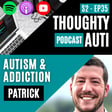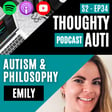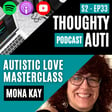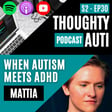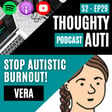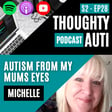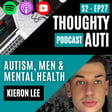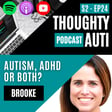
Autism & Puberty - The Terrors Of High School w/Actuallyaspling
What is high school like for an autistic teenager? What are the differences between the neurotypical and autistic experience of puberty? Why are autistic people targets for bullying and isolation?
In this episode of the Thoughty Auti Podcast, Thomas talks to Victoria Ellen (@actuallyaspling) about her experiences at secondary school and how puberty influenced her life.
We chat about our commonalities in tastes, our experiences with the various physical differences that occurred, the emotions, the masking and even a bit on romance at school!
I hope everyone is coping alright with the current COVID-19 situation, it can be a difficult time of transitioning... and I think many of us will find that difficult. Set up your routine, add in some variety, make sure to exercise and I'm sure we can pull through all of this craziness together!
Thank you for being such a loyal listener, I appreciate all the support you give me!!!
If you have an exciting or interesting story and want to appear on the next podcast, please contact me at: aspergersgrowth@gmail.com
Victoria's Links:-
► Blog - https://actuallyaspling.wordpress.com/link-directory/
► Instagram - https://www.instagram.com/actuallyaspling/
▬▬▬▬▬▬▬▬▬▬▬▬▬▬▬▬▬▬▬▬▬▬▬▬▬▬▬▬▬▬▬
Channel Merchandise - https://teespring.com/stores/aspergers-growth
Support via Patreon! - https://www.patreon.com/aspergersgrowth
Social Media ♥ -
☼ Facebook - Aspergers Growth
☼ Twitter/Instagram - @aspergersgrowth
♫ Listen On -
Spotify - https://open.spotify.com/show/6vjXgCB7Q3FwtQ2YqPjnEV
Apple Podcasts - https://podcasts.apple.com/gb/podcast/thoughty-auti-the-autism-mental-health-podcast/id1470689079
Music -
♫ Track: [Chill Music] Ikson - Reverie [No Copyright Music]
Advert Track: Empty Parking Lot - Colours Of Illusion [Epidemic Sound]








